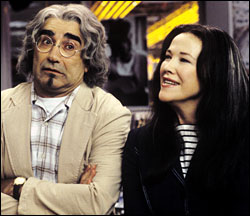Steve Martin and his old boss Tommy Smothers say the same thing: Their ironic stylethe dominant strain of all modern comedywas the inescapable consequence of what Martin Mull calls “the big folk-music scare of the 1960s.” It was such a massive hot-air balloon of solemn cluelessness, they had no choice but to pop it.
In A Mighty Wind, which opens Wednesday, April 16 at the Guild 45 and others, Christopher Guest’s increasingly polished improv-comedy team tries to pop it once more, in a similar deadpan fashion. If you guffawed at their spoofs of small-town drama queens (Waiting for Guffman) and dog-show stage mothers and dads (Best in Show), you’ll likely get yocks out of this one. Guest joins his former Spinal Tap bandmates Harry Shearer and Michael McKean to become a trio, the Folksmen, famed for the smashingly earnest album Singin’. John Michael Higgins, Parker Posey, and Jane Lynch (Best in Show‘s butch dog handler) lead the New Main Street Singers, whose Songs of Good Cheer and Sunny Side Up make the King Family seem like the Mansons. Eugene Levy (who co-wrote with Guest the skeletal plot filled out by the cast’s ad-libs) and Catherine O’Hara portray Mitch & Mickey, who made bundles making beautiful music together until their breakup and Mitch’s crack-up.
They all reunite decades later for a New York concert to honor the late folk impresario Irving Steinbloom and, they’re sure, to reignite the burned-out skyrocket of their careers. Will they steal one anothers’ best songs for the show? Will spacey Mitch stay sane? Will Mickey, long remarried, give him the resonant smooch that famously concluded every legendary performance of their hit, “Kiss at the End of the Rainbow?” Will the Folksmen croon their greatest hit, the perky “Old Joe’s Place,” or their angry harangue about the Spanish Civil War?
It’s pointless to try to identify any of the bands with particular satirical targets. This isn’t the Rutles, whose “Hold My Hand” and “Ouch!” correspond closely to originals. At this point, even codgers can’t quite put an arthritic finger on the difference between the New Christy Minstrels and the Serendipity Singers, so any too-specific joke would go over the baldest of heads. What is recognizable is the excellent pastiche of the overall style of the folk-music scare. The chords sound eerily familiar, and the tunes are often genuinely catchy. (No surprise there’s a soundtrack album with even more songs than the film, produced by T-Bone Burnett for the Coen Brothers’ company, hoping for another O Brother-like hit.)
“Well, there’s a puppy in the parlor and a skillet on the stove!” croon the Folksmen with cornpone alliteration and bobbleheaded bounce, “and a smelly old blanket that a Navajo wove!” Their sobersided “Blood on the Coal” brilliantly blends once-ubiquitous clich鳠from train songs, disaster songs, and downtrodden labor songs: “The train came round the corner, you could hear the trestle groan, but the switcher wasn’t switchin’ so they left the switch alone. Blood on the tracks, blood in the minebrothers and sisters, what a terrible time!”
Mitch & Mickey perfectly capture the inanity of folk love (“Cartwheels & piggybacks, it’s just that kinda day”). The album covers that flash on-screen are perfect, too: Songs From a Love Nest places their photo in a bird’s nest; their debut apes the design of Meet the Beatles. (You can collect them all on the movie’s unusually clever Web site: //amightywindonline.warnerbros.com/index.php.) Faced with the seemingly impossible task of making Minstrels/Serendipity-style songs still dippier for comic effect, they composed the inimitably icky likes of “Potato’s in the Paddy Wagon.”
The comic drama between the tunes is not quite up to the standard set by the musical numbers. It’s warm and funny, but never quite works up to a boil: I’d put it about on a par with Guffman, below Best in Show, and way below either Spinal Tap flick. The characters are skillfully etched, well-informed lampoons, fond but not treacly, pointed but not impaling. But none of them is quite as vivid as the same comics’ dog lovers were.
The big problem with sprawling ensemble comedies is keeping the focus, and with three groups and at least 16 main characters, Wind doesn’t. The real-life drama of dog shows gave Best in Show some needed oomph; Wind must struggle to avoid the ghastly pallor of those real reunions of the undead folkies that infest PBS. The tension of Mitch & Mickey’s reunion fizzles; other dramatic moments work better, but few truly sizzle.
The most striking comparison is with the Spinal Tap movies. There, the rock archetypes were so sharp that Aerosmith and everyone else took it personally, sure it was a dart aimed at their own hearts, even though the band was really as much an amalgam as the groups in Wind. The era’s startling transitions from songs about flower people to Stonehenge to devilish goth to big, dumb sex rock offered an infinitely richer comic vein to mine than folk songs about mining, trains, and earnest love. Wind tries to pull off a folk equivalent to Spinal Tap‘s transitafter Pickin’, Ramblin’, Hitchin’, and Wishin’, the Folksmen make a pathetic late-’60s last stab at relevance with Saying Something. But that wasn’t really what happened to folkies: They didn’t evolve hilariously, they just got drowned out by rock, like cavemen succumbing to bigger, meaner cavemen wielding nastier axes. Here’s the main reason for Spinal Tap‘s superiority: Flamboyant buffoons are intrinsically funnier than mild-mannered ones.
The fey whimsy of this fond folk confection will probably make you grin, but you won’t laugh so hard that you’ll break like the wind.








